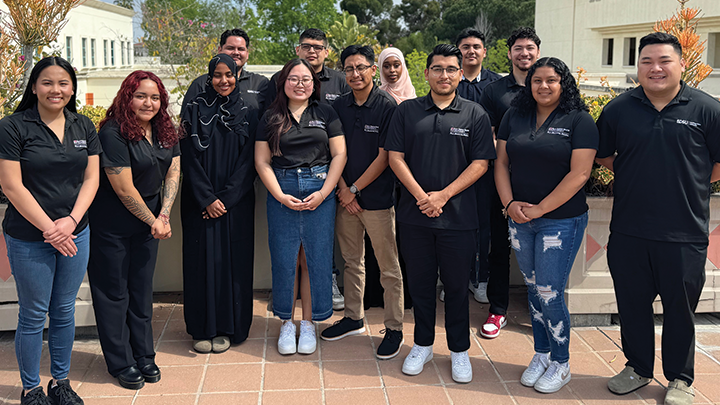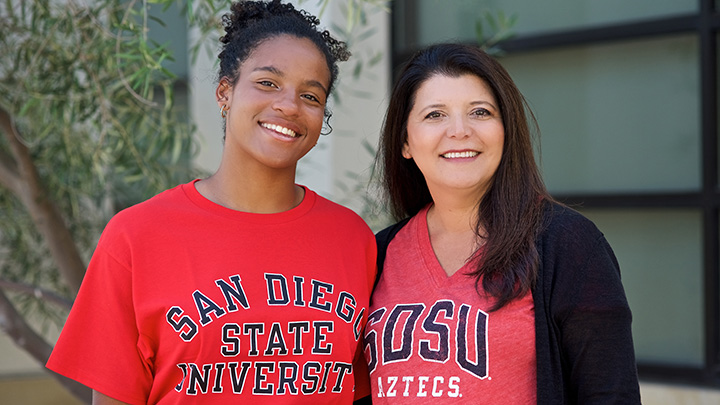A virtuous cycle
SDSU’s Price Community Scholars mentor younger students in City Heights, leading to more university enrollees.

The “Price” — as in Price Community Scholars — has been right for City Heights for more than a decade.
Since 2012, the Price Community Scholars program has enabled some of San Diego State University’s top students from the community located just southwest of the campus to mentor the next generation of young minds while addressing their own university financial needs.
The program is operated by the Office of Educational Opportunity Programs, Outreach and Success in the Division of Student Affairs and Campus Diversity. Created by noted entrepreneur and community advocate Robert Price and the family’s eponymous charities and charitable fund, the program is one of two partnerships between the Price family and the university that benefit both SDSU and the surrounding community.
The latest 10 students to cycle through the program graduated from SDSU this spring, bringing the number of Price Scholars over the years to 60. The 10 new graduates mentored 30 City Heights students, starting with them in the seventh grade and guiding them through their 10th grade year.
This cycle of mentorship has tangible benefits in City Heights, helping to create a pipeline for students to SDSU and other colleges.
“Students in City Heights are exposed to mentorship and put on the path toward higher education, and more students are pursuing postsecondary education as a result,” said Price Community Scholars Coordinator Cynthia Becerra.
For the scholars, the program has given them a chance to put their stamp on the community they call home while they overcome adversity of their own to make it to Commencement.
“I wouldn’t be able to express how grateful I am to them,” said Rodrigo Inzunza-Luna, a senior economics major. Inzunza-Luna, a 2020 graduate of Crawford High School, said he relished the opportunity to mentor the next generation from his neighborhood, hoping his guidance would help them achieve the same academic goals he has accomplished.
“Growing up, I always had a role model of someone helping me out as a mentor and always had younger people who looked up to me, and Price Scholars gave me the opportunity to be that in my community,” he said.
Price Scholars are selected every two years by a program staff committee. Fifteen students are selected from City Heights, primarily from Hoover and Crawford high schools, and are all first-generation prospective college students.
Some live in City Heights but attend other schools, such as Fernando Pluma, a current Price Scholar who graduated from nearby Helix High School.
Each student receives an $8,000 annual grant for four years and in turn, agrees to mentor three high-achieving students from Clark or Wilson middle schools and stay with them until their 10th grade year.
The current cohort began mentoring their students during the height of the COVID-19 pandemic, which created a unique set of challenges, given that all of the mentoring to start was done via video conferencing.
Tina Tran, a senior environmental studies major, said when she began mentoring her students, two boys and a girl, the mentees didn’t want to turn on their cameras.
“It was awkward navigating the virtual space, especially meeting a completely new stranger you are going to be with for the next four years,” Tran said.
Tran encouraged her students in their weekly Zoom meetings to become involved at school, become their academic advocates and not be afraid to ask for help.
As the meetings progressed, Tran said, her students began to open up and their relationships blossomed.
“Now, they have their cameras on, and they always start the meeting by saying, 'Tina, guess what’s going on?' — and they’re super-excited,” Tran said. “They have grown a lot and have become their biggest advocates; they’re more willing to write their own emails, going to teachers after hours, and they have all become pretty involved on campus.
“To see the growth has been pretty incredible,” Tran said.
Pluma, who graduated with a degree in aerospace engineering, said the opportunity to guide his three mentees meant a lot because mentoring was something missing from his formative years.
“I learned that I like being a mentor, I like being the person that I didn’t have, someone to look up to,” Pluma said. “I didn’t have someone to look up to or to talk about life or academics.
“My students are all first-generation and minorities. I see a lot of myself in them,” he said. “So it feels good to guide them and have an impact on them.”
In addition to guiding their students, the Price Scholars had to navigate their own academic journeys, some of which had unique hurdles.
Inzunza-Luna is an undocumented immigrant who dealt with the death of a close family member and also got married and had a child while at SDSU. At one point, his grades slipped and he was placed on academic probation. He said the Price Community Scholars program coordinators helped him correct course.
“I wouldn’t be able to express how grateful I am to Price Scholars,” he said. “Since freshman year they were always there for me.”
Inzunza-Luna and Tran both heard about the Price Scholars program from cousins who were Price Scholars. Now, the two said they want to give back to City Heights in their way — by creating their scholarship programs.
Tran, who will attend University of California, Santa Barbara for graduate school in Environmental Science and Management, said she hopes to return to City Heights and create a scholarship of her own for students to pursue the avenue of higher education of their choosing, as well as create a community garden program at the local schools she will call “Healthy Habits.”
Inzunza-Luna, who plans to build up his startup moving company, said he also wants to create a scholarship program for students as well as teach financial literacy to students and their parents.
“I believe that resources level the playing field between the haves and the have-nots,” he said.



